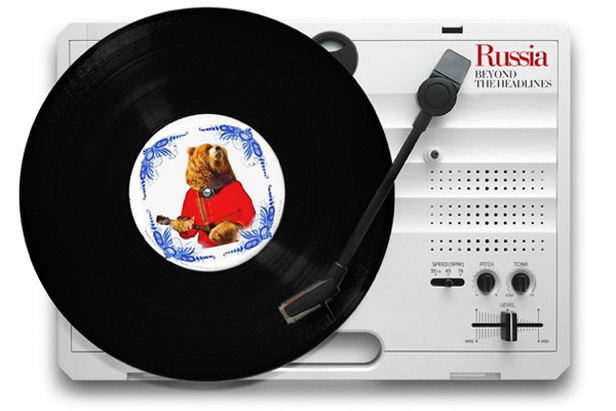Russian rock guru Boris Grebenschikov turns 60? Balalike it!

For those who don’t think that Russian music ends with the last chord of balalaika we would like to present our audio-podcast devoted to the contemporary Russian music. It’s up to you to decide whether you like it or even... balalike it.
BG was born in Leningrad (now Saint Petersburg) on November 27, 1953, to a factory director and a legal consultant. At the end of the 1960s, a young Grebenshchikov started to play the guitar (of course he couldn't go without learning the legendary Beatles) and began writing lyrics.
The rock band Aquarium has existed since 1973. The group was created by a student of Leningrad State University's math department by the name of Boris Grebenshchikov who became the band’s leader and music/songwriter.
 |
| Band members: Pyotr Troshchenkov, Boris Grebenshchikov, Alexander Titov, Vyacheslav Yegorov, Andrei Romanov |
Aquarium existed at roughly the same time as Yegor Letov’s band Grazhdanskaya Oborona, Victor Tsoy’s Kino, Pyotr Mamonov’s Zvuki Mu, and the same time as Sergey Kurekhin and other notable figures in Soviet underground rock. Mamonov aside, Grebenshchikov is, perhaps, the only musician from the circle who is alive and well and still writing songs to this day ("Harvest Fest in the Palace of Labor” – a song published today, for example)
Boris Grebrenshchikov has more than 30 albums under his belt released with Aquarium, solo albums, and in projects with fellow musicians. Grebenshchikov’s music can be heard in many films, his songs have been quoted numerous times in literary works (Viktor Pelevin, Tatyana Tolstaya, and others) and are generally reflected in Russian culture.
However, the scale of Grebenshchikov’s interests always went outside the formal boundaries of the Soviet Union. He incorporated the best and brightest that he found in other cultures in himself and his art.
His lyrics not only contain references to Russian folklore, but to Celtic and Indian folklore, as well. His attitude towards religion was also especially particular. At one time, he was drawn to Russian Orthodoxy and later to Buddhism. Surprisingly, this did not create any internal incongruities in him. The main message of almost all of his songs is “start with yourself, observe the world, don’t cause anyone harm. This so-called “Russified” Buddhism is still popular among people, especially among the intelligentsia, although it has come to be replaced by other forms of behavior, like activism, for instance, something that is much more proper, meaningful, European, and whatever else people like to say about it. Of course, this in no way enters into BG’s philosophy. “Take me to the river, lay me in the water, teach me the art of being peaceful,” Grebenshchikov poetically states. It is precisely this art—the art of accepting the world as it is—that BG has mastered to perfection and subsequently teaches his listeners.
And, in yet another of BG’s paradoxes, the number of his listeners does not dwindle. While many veterans of the stage put on concerts just for the sake of nostalgia for by-gone times where they sing time-tested hits to aging fans, Grebenshchikov still manages to draw young fans into his music and into his world. These young fans often see him as more than just a musician. They see him as a teacher, a guru, whose music contains a riddle that holds the key to understanding everything in life.
Indeed, his music contains many encrypted messages, whether it is a reference to the Talking Heads, Brian Eno, or Patti Smith. In his early years, he was a clear and unabashed imitation of Bob Dylan.
BG has become one of those privileged few who rub elbows with the most significant rock figures of the world stage. Among his friends and acquaintances are people like David Bowie, Lou Reed, and Iggy Pop. When things in the Soviet Union were leading to perestroika, it was thought that BG could become an international rock star. In 1987, American producers invited him to the United States where he collaborated with Dave Stewart, Annie Lennox and two dozen other musicians on the album “Radio Silence” (released in 1989). All but two songs were written in English. The album was number 198 on the Billboard 200, and its lead song, “Radio Silence”, rose to number 5 on the charts.
Some critics say that by trying to adapt to the new format, Grebenshchikov became less interesting from an artistic standpoint, just as anyone who tries to appeal to the masses and not dedicated fans. Nevertheless, Grebenshchikov has still managed to keep some sort of originality.
In March 2013, Grebenshchikov came out with the announcement that Aquarium will no longer talk to the media and is staying mum. At the same time, the group will also reduce the number of concerts it gives, but will continue working in the studio.
 |
| Young Boris Grebenschikov |
TRACKLIST:
1) Sestra (Sister)
2) Arigato
3) Kusok zhizni (Piece of life)
4) Rock'n'roll mertv (Rock'n'roll is dead)
5) Mechi stakany na stol (Put the glasses on the table)
6) Poezd v ogne (Train on fire)
7) Gorod zolotoi (Golden city)
8) Noga sudbi (The leg of destiny)
9) Prazdnik urozhaya vo dvortse truda (Harvest Fest in the Palace of Labor)
10) 2128506
All rights reserved by Rossiyskaya Gazeta.
Subscribe
to our newsletter!
Get the week's best stories straight to your inbox
